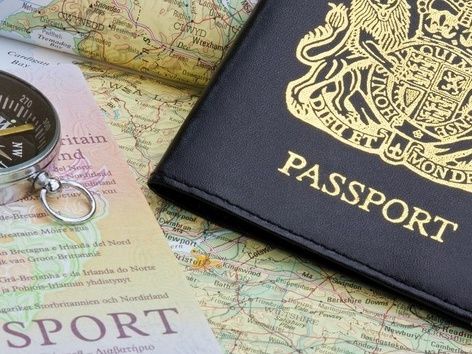Employment in Luxembourg: everything you need to know in 2024 (updated)

Luxembourg, a small country in the heart of Europe, is famous for its economic stability and high standard of living. If you are considering employment in this country, it is important to understand the process of obtaining a work visa, the specifics of the labour market and the taxation system. Find out more about the employment procedure in Luxembourg in 2024
Luxembourg continues to attract expats due to favourable working conditions, high incomes and low crime rates. Technology giants such as Amazon, Paypal and Skype choose this country to locate their offices, attracting specialists from this industry. The financial sector is another key area of Luxembourg's economy, providing 30% of the country's jobs.
Due to its cosmopolitan nature, Luxembourg is considered one of the most diverse countries in the world, with over 47% of the population being immigrants. Around 200,000 people from France, Germany and Belgium cross the border every day to work in Luxembourg, thanks to its favourable geographical location and efficient transport links.
Currently, foreign workers make up more than 70% of the country's workforce, which is a testament to the great international appeal of Luxembourg as a place to live and work.
Overview of the Luxembourg labour market in 2024
In 2023, the Luxembourg labour market slowed down due to the economic recession, especially in the construction sector. According to the National Statistics Office, the number of people employed grew by 2.2%, which is a decrease compared to the previous year. The construction sector was the most affected by the recession, with the number of jobs decreasing by 0.9%. This followed a 2.7% increase in the previous period.
The need for state support for companies in this sector became apparent as 46 out of 114 companies applied for state aid to pay wages through the partial unemployment programme.
The government said that 9,093 full-time employees across all eligible sectors will receive the assistance next month, up from 7,920 in March. However, according to the Statec report, the real estate sector, which is not eligible for government subsidies, saw job growth slow by 8 percentage points from 2022 to 2023, although the total number of jobs in the sector grew by 1%.
Last year, job growth in all sectors slowed, except for the public sector, which grew by 3.6%. The financial sector, which generates a significant portion of the country's GDP, also increased the number of jobs by 3.3% year-on-year, but this is less than the 3.6% in the previous period.
At the end of last year, there were 482,570 registered employees in Luxembourg, of whom 226,189 were cross-border workers. The total number of employed residents was 255,653, of whom more than half, almost 131,000, were foreigners.
The number of non-EU workers increased by 9.1% in the last quarter of 2023 compared to the same period in 2022. At the same time, the number of EU citizens working in the country has been declining for four consecutive quarters over the past year.
The largest share of those employed in certain labour sectors is concentrated in retail trade, transport, restaurant and hotel business, where 106,709 people worked. It is followed by the public sector with over 104,000 employees.
Despite moderate growth in the labour market, wage costs increased by 8.6% between the last quarter of 2023 and the last three months of 2022. This is higher than in the Eurozone (4.5%), largely due to three indexations caused by high inflation.
The National Statistical Agency foresees a slowdown in the growth of wage costs this year, with the next indexation payment projected for the last quarter of 2024.
Planning a trip or move abroad? An important part of a successful trip is an insurance policy, as it guarantees high-quality medical care anywhere in the world and can protect you from unnecessary expenses while travelling. You can buy insurance from trusted agents on the Visit World portal.
Work visa for Luxembourg 2024
Citizens of most EU countries, with the exception of Croatia, do not need to obtain a visa before moving to Luxembourg. Also, representatives of the member states of the European Free Trade Association (EFTA), which includes Switzerland, Iceland, Norway and Liechtenstein, are exempt from the need to obtain a special work permit in the Grand Duchy.
Representatives of the rest of the world need to obtain a work visa before moving to Luxembourg.
Depending on the length of stay, work visas to Luxembourg are divided into:
1. Short-term visa (type C) - allows foreign specialists to stay in the Schengen area for 90 days or a total of 90 days within a 180-day period. This visa is usually used for business trips, meetings, conferences and family visits.
2. Long-term visa (type D) allows you to stay in the country for more than 3 months for work, study or permanent residence. This type of permit is usually granted to employees, highly qualified specialists, students and carers.
Depending on the type of planned activity, work visas in Luxembourg are divided into:
1. Employee visa or work visa;
2. Permit for highly qualified personnel (EU Blue Card);
3. Au Pair youth visa; Student work visa;
4. Work visas for freelancers, entrepreneurs and self-employed persons;
5. Visa for seasonal workers.
The documents for obtaining a permit are examined by the Luxembourg Department for Foreigners. Usually you need to provide:
1. A copy of a valid passport;
2. A copy of the birth certificate;
3. Copies of diplomas and other certificates confirming qualifications;
4. Duly completed CV, short biography and motivation letter;
5. Certificate of no criminal record;
6. A copy of the employment contract and the certificate of eligibility for work received from ADEM.
All documents must be translated into one of the following languages: French, German or English.
Taxes for foreign workers in Luxembourg 2024
Expats must pay income tax on their income, regardless of whether they work for a company or are self-employed. Residents have to pay tax on their worldwide income while non-residents have to pay only on the income earned in Luxembourg.
Employees are assigned a tax class based on their marital and residency status, which, along with their earnings, determines how much income tax they pay.
Ordinary taxpayers in Luxembourg make tax contributions from their salaries. However, they must file a withholding tax return with the Administration des pributes directes (ACD) to ensure that they pay the correct amount. This is known as assessment taxation.
Daria Rogova, Head of Insurance at Visit World
To move, travel or work safely in a new country, you will need health insurance. You can apply for an extended policy on our website here.
Products from Visit World for a comfortable trip:
Checklist for obtaining a visa and necessary documents in Luxembourg;
Legal advice on immigration to Luxembourg;
Travel insurance for foreigners in Luxembourg;
Medical insurance all over the world.
We monitor the accuracy and relevance of our information. Therefore, if you see any error or discrepancy, please write to our hotline.
Recommended articles
3 min
Education
Moving to Luxembourg to study 2024: a detailed guide (updated)
Luxembourg offers unique opportunities for higher education and a new cultural environment. This country has a number of prestigious educational institutions offering programmes at various levels. Find out more about the specifics of higher education in Luxembourg in 2024, visa requirements and tuition fees
02 Apr. 2024
More details2 min
Employment
How to find a job in Luxembourg: a detailed guide for expats with changes for 2025
Luxembourg is a country of opportunity, attracting the best global talent with its thriving economy and career prospects. The local job market is unique – international and multilingual, requiring in-depth knowledge of languages, regardless of sector or profession. Luxembourg will continue to attract foreign workers in 2025. Learn more about working in Luxembourg in 2025 for foreigners, the most popular vacancies and get useful tips for finding a job
19 Dec. 2024
More details2 min
Expats
Luxembourg visa requirements for Nepalese nationals in 2025: new rules, visa types and documents
Luxembourg is a country with a rich history, architectural beauty, cultural heritage, as well as a developed economy and political stability. Therefore, it is not surprising that the state has become an attractive destination for many foreigners wishing to visit the country for work or study. Read more about Luxembourg visa requirements for Nepalese nationals
21 Jun. 2025
More details2 min
Expats
Cost of living in Luxembourg in 2025: a detailed guide
Luxembourg boasts a strong economy and a stable political system. The Grand Duchy is a popular destination for foreigners. However, an important factor when choosing a country to move to is the cost of living. Find out about the total cost of living in Luxembourg per month, the cost of housing, the cost of utilities, medicine and food in 2025
03 Mar. 2025
More detailsAll materials and articles are owned by VisitWorld.Today and are protected by international intellectual property regulations. When using materials, approval from VisitWorld.Today is required.
